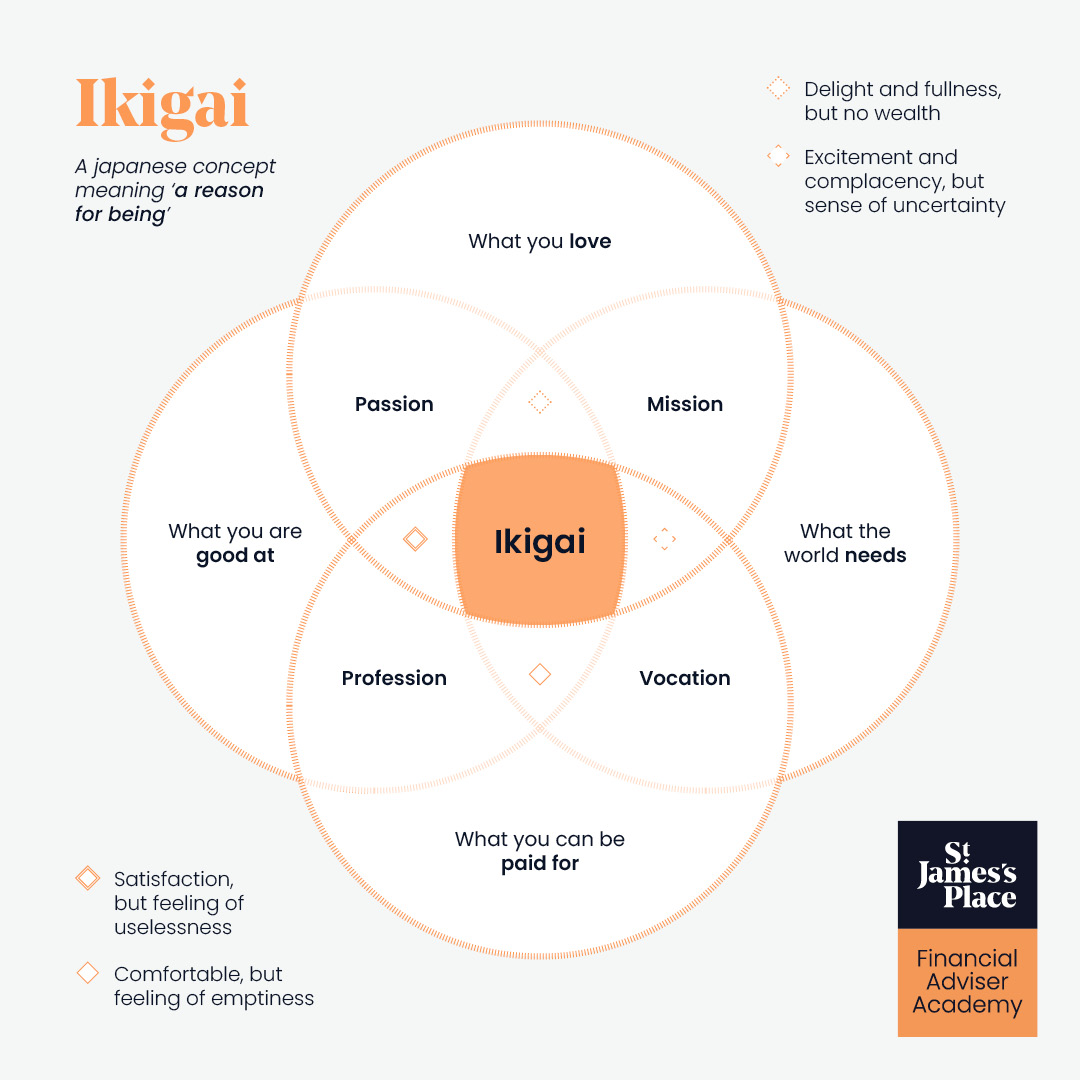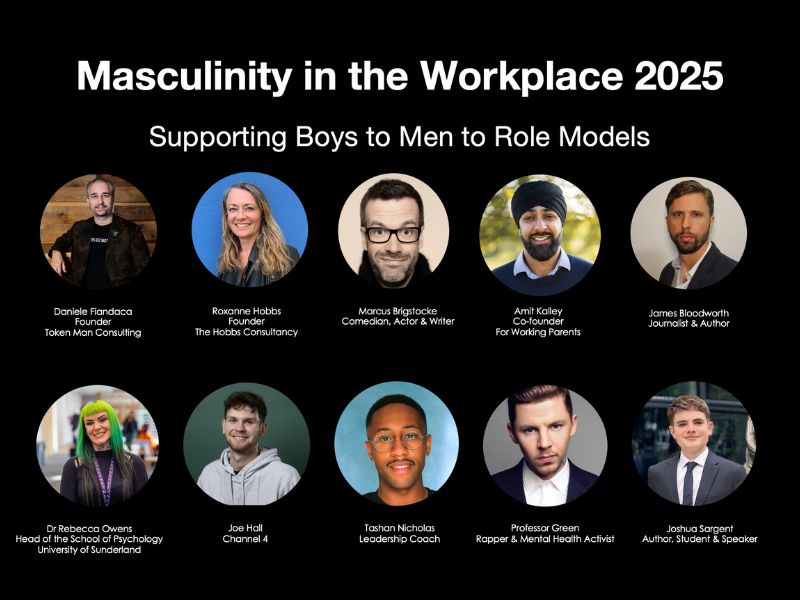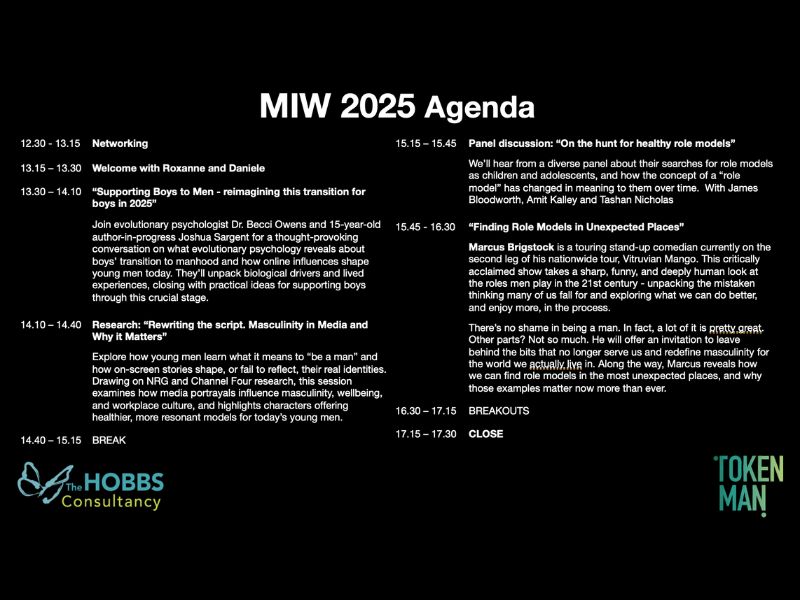
Article by Gee Foottit, St. James’s Place Financial Adviser Academy
Taking lessons from the principles of Ikigai can change the way that we look at our lifestyle and guide us on how to make the most of the world around us.
Understandably, everyone’s Ikigai will look very different. To discover it for ourselves, we can start by asking ourselves the following questions:
That’s not to say that finding our Ikigai is an easy process, it takes much self-reflection which can be uncomfortable – there’s no magic formula. if our pursuits fulfil the above criteria, we can be reassured that we are on the right path.

We get told all too often that stress is detrimental to both our physical and our mental well-being. In fact, it has been widely observed that a reasonable level of stress can be beneficial in developing healthy habits. The book Ikigai: The Japanese Secret to a Long and Happy Life states “People who maintain low levels of stress, who face challenges and put their heart and soul into their work in order to succeed, live longer than those who choose a more relaxed lifestyle and retire earlier.”
Is your job keeping you up at night or taking over your free time, you could be overly strained by your job. This is a time to reflect on whether it’s truly worth it. Equally, do you feel like you are coasting? If so, perhaps it’s time to move on to bigger and better challenges. Whilst high levels of stress are never advisable, it can also be equally damaging to your prospects to remain in a role that lacks purpose, passion, or motivation.
It’s a human trait that we find our rhythm and stick to it. We’re creatures of habit believing that if it isn’t broken, there’s no need to fix it.
But breaking habits has more benefits than we might think.
“A lack of mental exercise is bad for us because it causes our neurons to deteriorate – and, as a result, reduces our ability to react to our surroundings.”
Whether it’s a new hobby such as crafting, cooking or making a more significant change, the brain is invigorated when presented with new information.
Financial Adviser Rachel Stewart found that her career lacked fulfilment after a 15-year stint in law: “I found myself sitting behind a desk often doing work for other people which I felt didn’t deliver a huge amount of purpose. It was easy to feel that I’d been put in a box and unable to spread my wings in this career.”
Rachel joined the St James’s Place Financial Adviser Academy in 2019 and now runs a successful financial advice business: “Starting my own business has completely changed my life. I am now content in all areas of my work and family life – it’s a great place to be.”
All too often takes a crisis (burnout, getting the sack or a pandemic) for us to stop and rethink our current lifestyle. Being proactive in finding your Ikigai means that you needn’t wait to find your purpose or meaning.
Although there is no set path to finding your Ikigai, one key element is finding your ‘flow’. According to psychologist Mihaly Csikszentmihalyi, flow refers to the pleasure, delight, creativity, and process of being completely immersed in what we are doing.
“In order to achieve this optimal experience, we have to focus on the time we spend on activities that bring us to this state of flow”
Finding your flow often goes hand in hand with finding your ‘why’. Our work becomes more meaningful when we put this at the centre of our decision-making. García and Miralles offer three key strategies for finding your flow:
Concentrate on a single task – in order to focus, we need to be in a distraction-free environment and to have control over what we are doing at every moment. To do two things at once is to do neither – contrary to popular belief, humans are not great multi-taskers.
Choose a difficult task to complete that aligns with your abilities but still challenges you. Enjoy the process of pushing yourself and being satisfied with your achievement.
Have a clear, concrete objective but don’t obsess over it. Use your goals as a compass to guide you rather than as a map to direct you.
That is not to say we should completely abandon the more mundane activities to pursue deeper meaning. Csikszentmihalyi emphasises the importance of ‘microflow’, or the ability to turn routine into something we enjoy. We all must do such tasks, but the key is finding the right balance between flow and microflow – between the transactional activities and the transformational ones.
Communities that work towards a common goal and lean on each other in times of hardship can thrive.
“For many, serving the community becomes part of their Ikigai… the feeling of belonging and support gives the individual a sense of security and helps increase life expectancy.”
This community support can also apply to your career.
Jonny Shingles, who joined the Academy after a career in the Royal Air Force, shares his journey on starting his own practice: “If you have the support of knowledgeable people and an established brand with great resources, you get a head start.”
Jonny’s client base is also a diverse mix of his own contacts, including those from the Air Force. Without the support of his community – both within SJP and beyond – Jonny’s business would not be where it is today.
Every career, no matter what ranking or sector, involves difficult moments and challenges. It is how we deal with these moments that defines who we are.
Nana korobi ya oki 七転び八起き
Fall seven times, rise eight.
It all comes down to adapting and focusing on the things you can control – rather than worrying about the things you can’t. – the key to a successful career. Yet, there is also resilience in antifragility and this comes down to eliminating the things in our life which make us weak in the first place.
“Antifragility is beyond resilience. The resilient resists shocks and stays the same; the antifragile gets better.”
Figuring out your Ikigai may be a quick process or it could take a while, but that’s okay. It doesn’t have to be complicated, Our Ikigai is our passion, a unique talent that brings meaning to your day-to-day and helps us to achieve your goals. The closer you become to your Ikigai, the longer – and happier – your career will be.
 About the author
About the authorGee helps driven individuals, who are looking to change career and could benefit from the support offered by the St. James’s Place Academy; an opportunity to train to be a professional Financial Planner with the backing of a FTSE 100 Company.
November
13nov10:0016:00Start Up and Small Business Expo | Polka Dot Events/ Avidity Hotels
13/11/2025 10:00 - 16:00(GMT+00:00)
Best Western Rockingham Forest Hotel
Rockingham Road, Corby, NN17 2AE
Come check out the Start Up and Small Business Expo, where you can discover new businesses and network with fellow entrepreneurs! Start Up and Small Business Expo Welcome
Start Up and Small Business Expo
Welcome to the Start Up and Small Business Expo! Join us at the Rockingham Forest Hotel for a day filled with networking, learning, and growth opportunities for your business. Connect with fellow entrepreneurs, discover new products and services, and gain valuable insights from industry experts. Whether you’re just starting out or looking to take your small business to the next level, this event is the perfect place to be. Don’t miss out on this exciting opportunity to expand your business horizons!
13nov13:0014:00The Rebellious Business Networking Event | Rebellious Business
13/11/2025 13:00 - 14:00(GMT+00:00)
No beige small talk. No boring intros. No salesy nonsense. Just real people, genuine conversation, and business magic waiting to happen. What’s This
This isn’t your average “so what do you do?” Zoom snooze-fest.
This is The Rebellious Business Networking Event — the one that refuses to play by the boring corporate rules.
We’ve ditched the stiff intros, awkward icebreakers, and those weird, staged elevator pitches that make everyone’s soul leave their body.
Instead, you’ll get one hour of genuine connection, plenty of laughs (and probably a few spit-out-your-tea moments), and a room full of humans who actually get it.
Zero Corporate SH★T – Be yourself. That’s literally the point. No pretending. No LinkedIn voices.
Connection-First Games – Fun breakout challenges that help you meet people naturally (and remember their names afterwards).
Real Conversations – None of that “so… what do you do?” small talk. You’ll actually talk about stuff that matters.
Collaboration Energy – Meet your next client, partner, or business bestie without it feeling forced.
Surprise Rebel Moments – You might win something. You might laugh-snort on camera. Either way, you’ll leave buzzing.
You, if you’re a coach, consultant, creative, service provider — or just a business rebel who’s over the fake, buttoned-up networking scene.
We’re talking about people who’d rather connect than pitch. People who build businesses with personality.
If that sounds like you, welcome home.
We’re Cordelia & Caroline, your rebellious ring-leaders.
We met at a networking event (yep, the irony’s not lost on us), became business besties, and built Rebellious Business, a company for entrepreneurs who are bored of the beige.
We’ve hosted thousands of rebels, helped countless people find clients, collaborators, and even business “love stories”… all through connection that actually feels human.
This isn’t just a networking event. It’s a movement for people who want to build businesses their way, real, rebellious, and full of personality.
Come hang out, meet your people, and see why rebels never network alone.
19nov10:0013:00MenoMinds – Free Training for Women in Business | Menospace & Minds That Work
19/11/2025 10:00 - 13:00(GMT+00:00)
Introducing MenoMinds – Free Training for Women in Business We’re excited to share MenoMinds, a fully funded programme created by Menospace and
We’re excited to share MenoMinds, a fully funded programme created by Menospace and Minds That Work, supporting women in business, freelancing, or entrepreneurship through the emotional and mental challenges of menopause.
Wednesday 19th November | 10:00am – 1:00pm (UK)
Live on Zoom | 💷 Free (funded by NEBOSH’s Social Purpose Programme)
Menopause can affect confidence, focus and wellbeing — MenoMinds helps you take back control with practical tools and a supportive community.
You’ll explore the CARE Framework:
Includes a digital workbook and invitation to monthly community groups on sleep, nutrition and stress management.
Freelancers, entrepreneurs, and women in small or micro-businesses (under 50 employees).
Facilitators: Haley White (Menospace) and Victoria Brookbank (Minds That Work)
19nov12:3018:00Masculinity in the Workplace - 2025 (In-person)
19/11/2025 12:30 - 18:00(GMT+00:00)
Conway Hall
25 Red Lion Square, London, WC1R 4RL
Brought to you by Token Man and The Hobbs Consultancy. Welcome to Masculinity in the Workplace, designed specifically to

Welcome to Masculinity in the Workplace, designed specifically to engage men with creating inclusive cultures. Marking International Men’s Day, the objective of our event is to give men both the reason and the skills to lean into the conversation, while also providing women and non-binary people with the confidence to engage more men in culture change. Because ultimately we can only make real change by working together.
Date: Weds Nov 19 2025
Time: 12.30pm to 6pm
Location: Conway Hall, 25 Red Lion Square, London, WC1R 4RL
Our speakers will share their insights and experiences, shedding light on the evolving dynamics of masculinity, leadership and culturein diverse work environments. You’ll have the chance to ask questions, participate in interactive sessions, and network with like-minded professionals.
The theme for this year is ‘Supporting Boys to Men to Role Models’. This year’s event will seek to understand the concerns and barriers that are in the way for boys and men, particularly looking at key inflection points in their lives. It will equip parents, leaders, friends and persons of significance in the lives of young men with the tools for self-reflection, effective role modelling and courageous conversations..
It will suggest that status-seeking and risk-taking behaviours are innate as boys become men, look at how this shows up for boys in 2025 and question what support could help these boys have a more positive initiation in to adulthood so that they are ready for the workplace. We know that there is a reverse gender pay gap and that schools aren’t preparing students in the same way to enter the professional workplace – what needs to be done?
We will look at the behaviours that are role modelled by men once they are in the workplace. Is it healthy for us to look for male role models, or is a search for positive behaviours more effective? What can we learn from how men are represented on screen and in the media? And what can we do to support our men once they are in the workplace?
This site is for the in-person experience. Otherwise you can register for the online version here.
FYI – lunch will not be provided

This event is for anyone passionate about creating more inclusive, equitable, diverse and human workplaces, and we welcome attendees of all identities and expressions.
Historically, our audience has included around 60% men and 40% women or non-binary people, with a wide range of roles and lived experiences.
This year, we’re especially keen to welcome CEOs, HRDs, CMOs, Inclusion & Diversity leaders, People & Culture teams, and anyone working to engage men more effectively in their organisations. Whether you’re a parent, people manager, or someone invested in systemic culture change, this event is for you.
By attending, you’ll be joining a growing community of people committed to reshaping masculinity, unlocking allyship, and building workplace cultures where everyone can thrive – from boys and young men to senior leaders and everyone in between.
20novAll DayDigital Transformation Conference
20/11/2025 All Day(GMT+00:00)
Mercure London Earls Court
London
Ready to transform your business in the digital age? The upcoming Digital Transformation Conference UK promises an exceptional opportunity for leaders who want to accelerate change, embrace innovation and shape
Explore how industry leaders are redefining digital and business transformation. Learn proven strategies, gain fresh perspectives, and connect with peers shaping the future of technology and enterprise. Tactical & practical content to drive your transformation efforts.
Throughout the day, delegates can look forward to a diverse programme of content exploring every aspect of digital transformation, business change, and innovation. Hear best practices, lessons learned, and insights into real-world challenges from leaders driving progress across digital, technology and IT.
If you’re a C-suite leader, head of innovation, transformation or IT, this is the place to be. Whether you’re just starting your journey or looking to scale up, you’ll leave with fresh ideas, new contacts and a renewed sense of direction.
